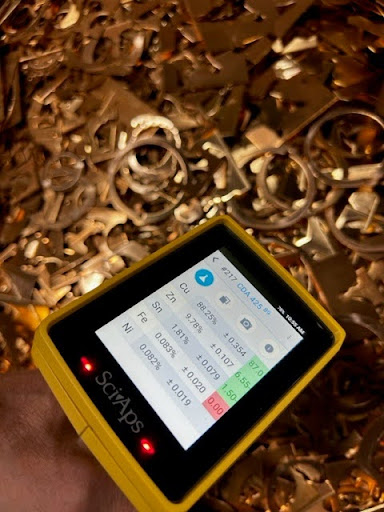Miller Recycling likes to keep our customers informed about new developments in the recycling industry and make predictions about the future of the scrap metal market, but we know that most business owners are primarily concerned with one thing: today’s price. When you need hard-to-manage waste hauled away, you want to pay as little as possible. And when you have non-ferrous scrap metal and other valuable recyclables to sell, you just want to get the best price you possibly can.
In our continuing efforts to keep our prices as competitive as possible, we’re always looking for ways to do things more efficiently. Speeding up even a few of our processes can make a big difference in a high-volume operation like our commercial recycling facility. By increasing how much material we can process in a day, we’re able to pass those savings along to our customers.
With that goal in mind, we recently invested in some new equipment to help our team process non-ferrous scrap metal even more efficiently. We think it’s pretty exciting stuff and hope you will too.
Check Out Miller Recycling’s New Equipment for Processing Non-Ferrous Scrap Metal!
First up: our new scrap alloy analyzer.
As you know, a lot of scrap metals are alloys formed by combining multiple metal types together. For example, brass is an alloy that’s composed primarily of copper and zinc, while bronze is an alloy of copper and tin. Both brass and bronze can contain small amounts of additional elements like iron and nickel. Alloys can be challenging for scrap metal recyclers because you can’t necessarily tell what a metal is made from just by looking at it. If a recycler isn’t sure what a piece of scrap metal is composed of, they don’t know how to sort it. And they’ll waste time trying to figure out what those “mystery metals” really are.
Our new scrap alloy analyzer takes all the mystery out of sorting mixed scrap metal, and it’s especially useful for non-ferrous metals. It’s a handheld device that uses X-ray fluorescence spectroscopy to essentially take quick X-rays of metal. Every element has a unique wavelength, which the device is able to measure and translate into percentages.
You can see an example of the analyzer’s readout in the photo. The particular metal that we had tested with the device was brass composed of about 88 percent copper (CU), 10 percent zinc (ZN) and small amounts of tin (SN), iron (FE) and nickel (NI). Being able to point a handheld device at metal and get that kind of breakdown in seconds is already helping us sort and process mixed metal more efficiently.
This new piece of equipment should also give our customers peace of mind knowing that they’re getting the right price for what they have and aren’t being undersold for their scrap metal.
Second: our new industrial wire stripping machine.
Historically, removing the casings from heavy-duty wire and cable has been difficult. Armored BX cable is designed to be resistant, so getting out the valuable copper wire contained inside the sheath could be too time-consuming to be worthwhile.
Our new industrial wire stripper allows us to process BX cable and other cables and wires quickly. We could feed a high-voltage cable with the diameter of a soda can through the machine and the jacket would be removed from the copper core in seconds. This machine can strip wires and cables of all sizes and types, including copper and aluminum wire. Now we’re able to process a high volume of wire and cable in a fraction of the time it used to take. The machine is also compact and only takes one person to operate, so it’s a highly efficient addition to our facility.
Both pieces of equipment are still relatively new to us, so we’ll keep you updated on how they improve our processing abilities. But the important takeaway for now is that we’re excited to expand our recycling capacity in a way that allows us to keep our prices competitive. We know the bottom line is ultimately the most important thing to our customers, so that’s what’s important to us too.
Contact Miller Recycling for Help Managing Non-Ferrous Scrap Metal
Have questions about Miller Recycling’s new equipment and how it might affect pricing for your non-ferrous scrap metal? Or any questions about managing your scrap metal and other recyclable waste? I’m always happy to help in any way I can. Feel free to contact me now with any questions!


